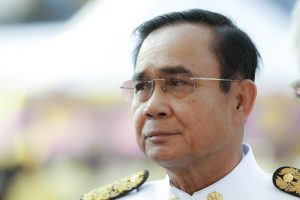Thai Prime Minister Prayut Chan-o-cha has officially launched his campaign for the upcoming general election, as he accepted his party’s nomination for prime minister. Speaking to a crowd of around 1,000 supporters of his United Thai Nation Party in Bangkok on Saturday, the Thai leader promised to create a new political dispensation that would transcend the country’s paralyzing political conflicts.
“We will create a new political climate,” Prayut said in the speech, The Associated Press reported. “We will have policies that address issues of the people and the country, and most importantly – and I only need to say one word, I don’t need to expand or anything – we will move beyond conflict.”
The speech came a week after he dissolved parliament, paving the way toward a May 14 election date that, some new wrinkles notwithstanding, is once again set to be hotly contested.
While Prayut’s rhetoric of unity and comity might seem like standard fare in democratic politics, it carries a slightly different charge in the context of the country’s recent battles. The theme of transcending or “moving beyond” Thailand’s political divides was also used as a justification for the military coup that Prayut led in May 2014, which overthrew the government led by Prime Minister Yingluck Shinawatra (Thaksin’s sister), and for the five years of direct military rule that followed.
At the time, Prayut said that the coup was necessary to end an ongoing political crisis and “reform the political structure, the economy, and the society” after years of paralyzing conflict. As Prayut said on Saturday, according to the AP, “We cannot have any more conflict. In the decades that have passed, there have been problems. Don’t forget. Don’t have short-term memory. We cannot let it happen again.”
But aside from a few wrinkles and subplots, the main plotline of the May 14 election does seem much the same as those of the past quarter-century. The election is set to pit the Pheu Thai Party (PTP), which is closely associated with former Prime Minister Thaksin Shinawatra, against a political establishment that has long viewed its popularity as a threat to its wealth and power.
Thaksin’s political movement has won every election that it has contested since 2001, but has been removed from power by a variety of underhand means, from two coups – in 2006 and 2014 – and hair-splitting and politically motivated court rulings.
In this year’s election, as in 2019, chicanery is a structural feature of the political system created by the constitution passed by Prayut’s military government in 2017. This allows 250 unelected and pro-military senators to vote along with the lower house of parliament to select the country’s next prime minister.
As a result, any single party or coalition needs to win 376 of the 500 seats in the lower house, rather than a simple plurality of 251, to form a government and ensure that its candidate is elected prime minister. This firewall that has been created implicitly – and where some senators are concerned, explicitly – to keep the Shinawatras out.
Even in the unlikely event that the PTP does manage to win the necessary margin, or cobble together a coalition that does, its actions will be limited by the political circuit-breaker of military intervention.
Prayut’s comments are ominous less because he is in a position to launch a coup himself than as a reflection of the conservative establishment’s view of the permissible outcomes of Thailand’s democratic process. Similarly concerning were the remarks made last week by Prawit Wongsuwan, the leader and prime ministerial candidate of the military-backed Palang Pracharath Party, when a democratic activist asked him whether a coup might happen.
In short, he refused to rule it out. “With Thais standing united as one, there will be no disagreement and no use of violence, and a coup will be unnecessary,” said Prawit, a former army chief who was a leading member of Prayut’s junta after the 2014 coup. “However, if the country falls into turmoil, a coup is a must.”
It might be alarmist to assume that a coup is in Thailand’s near future, but it would be equally foolish to rule it out. The country’s history of military interventions has an obvious delimiting effect on its democratic system – making beyond a certain point, entrenched interests will simply upturn the game board and reset the rules to their own benefit. As Ruchapong Chamjirachaikul, a political specialist at the Thai digital and legal rights NGO iLaw, told BenarNews last week, “if Thai history has taught us anything, whenever there is a public political vacuum, there’s always a coup.”
The problem is that Thailand’s divide is an outgrowth of a genuine and fundamental political disagreement: whether political authority ought to derive from the will of the people and or whether it should be vested in a traditional elite claiming a moral right to rule. The establishment’s calls for unity and a “new political climate” are effectively a demand that this question be placed beyond contestation. Small wonder, then, that the question continues to surface year after year.

































